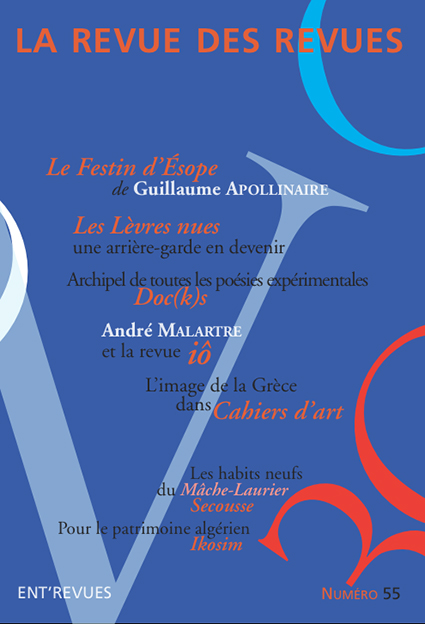par par/by Michel P. Schmitt
2016, in La Revue des revues no 55
 Le surréalisme belge n’a pas partagé grand-chose avec son cousin français, dominé par la figure d’André Breton. En publiant à Bruxelles, d’avril 1954 à novembre 1958, la dizaine de numéros de la revue Les Lèvres nues, Marcel Mariën fit la démonstration que la révolte qui s’était emparée de la jeunesse européenne au début du siècle, écœurée par la bêtise du vieux monde et la boucherie de la Grande guerre, exaltée par la jeune Révolution bolchévique et quelques grands modèles littéraires de la fin du XIXe siècle, avait pris des formes originales, notamment à travers les textes de Paul Nougé que Mariën s’employa à rassembler. Assez rapidement, il ouvrit ses colonnes aux jeunes lettristes de Potlach, Guy Debord et Gil J. Wolman. En contribuant à populariser un concept comme la psychogéographie ou la théorie du détournement, la revue facilita l’émergence du situationnisme. Sous les formes les plus variées (photos, dessins, textes théoriques, chroniques, saynètes, jeux de mots, reportages…), Les Lèvres nues tentèrent d’unifier trois formes de la pensée radicale : la subversion du discours, le marxisme-léninisme révolutionnaire et une utopie sociale fondée sur une conception poétique du monde.
Le surréalisme belge n’a pas partagé grand-chose avec son cousin français, dominé par la figure d’André Breton. En publiant à Bruxelles, d’avril 1954 à novembre 1958, la dizaine de numéros de la revue Les Lèvres nues, Marcel Mariën fit la démonstration que la révolte qui s’était emparée de la jeunesse européenne au début du siècle, écœurée par la bêtise du vieux monde et la boucherie de la Grande guerre, exaltée par la jeune Révolution bolchévique et quelques grands modèles littéraires de la fin du XIXe siècle, avait pris des formes originales, notamment à travers les textes de Paul Nougé que Mariën s’employa à rassembler. Assez rapidement, il ouvrit ses colonnes aux jeunes lettristes de Potlach, Guy Debord et Gil J. Wolman. En contribuant à populariser un concept comme la psychogéographie ou la théorie du détournement, la revue facilita l’émergence du situationnisme. Sous les formes les plus variées (photos, dessins, textes théoriques, chroniques, saynètes, jeux de mots, reportages…), Les Lèvres nues tentèrent d’unifier trois formes de la pensée radicale : la subversion du discours, le marxisme-léninisme révolutionnaire et une utopie sociale fondée sur une conception poétique du monde.
[The Naked Lips]. An “arrière-garde” in formation
Belgian Surrealism had little in common with its French cousin, dominated by the figure of André Breton. Publishing in Brussels, from April 1954 to November 1958, the ten or so issues of the review Les Lèvres nues, Marcel Mariën demonstrated that the revolt that seized European youth in the beginning of the century, disgusted by the idiocy of the old world and the massacres of the Great War, exalted by the young Bolshevik revolution and a few great literary models of the late 19th century had taken original forms, in particular in the texts by Paul Nougé that Mariën set out to gather. Soon, he opened his columns to the young writers of Potlach, Guy Debord and Gil J. Wolman. As it contributed to make a concept like psychogeography or the diversion theory popular, the review facilitated the emergence of the Situationist movement. In a variety of forms (photographs, drawings, theoretical essays, chronicles, short scenes, puns, reports…), Les Lèvres nues strove to unite three forms of radical thought: the subversion of speech, revolutionary Marxism-Leninism and a social Utopia based on a poetical conception of the world.